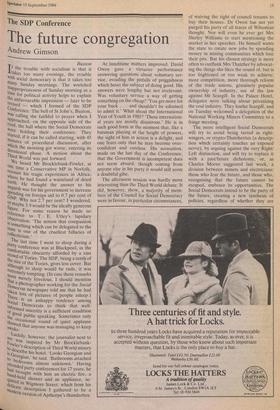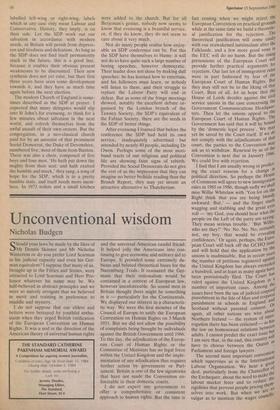The SDP Conference
The future congregation
Andrew Gimson
Buxton If the trouble with' socialism is that it takes too many evenings, the trouble with social democracy is that it takes too holding their conference. They started, if it can be called starting, with 45 Minutes of procedural discussion,. after which the morning got worse, entering its devotional phase. A motion about the Third World was put forward. We heard Mr Brocklebank-Fowler, at One time a Conservative MP in Norfolk, recount his tragic experiences in Africa, where he had found a wasteland of dried earth. He thought the answer to his anguish was for his government to increase spending on foreign aid to 0.7 per cent of GNP. Why not 2.7 per cent? I wondered, ,er maybe 3.9 would be the ideally generous figure. For some reason he made no reference to T. • E. Utley's lapidary observation: 'The notion that compassion Is something which can be delegated to the state is one of the cruellest fallacies of collectivism.'
The last time I went to sleep during a Party
conference was at Blackpool, in the comfortable obscurity afforded by a vast the of Tories. The SDP, being a tenth of me size of the Tories, gives less cover. But although to sleep would be rude, it was extreme) mciy tempting. (In case these remarks seem merely frivolous, I should mention that a photographer working for the Social ". ernocrat newspaper told me that he had . taken lots of pictures of people asleep.) There is an unhappy tendency among Social Democrats to think that well- informed sincerity is a sufficient condition Pod public speaking. Sometimes only occasional round of quiet applause 'flowed that anyone was managing to keep awake.
Luckily, however, the journalist next to me was inspired by Mr Brocklebank- trMvIer's description of Third World misery t() describe his hotel. 'Looks Georgian and s , Georgian,' he said. 'Bathrooms attached _Lo, bedrooms almost unknown.' Having 4,rrended party conferences for 17 years. he had brought with him an electric fire, a hand-held shower and an appliance, ac- quired , in Wigmore Street, which from his modern description I gathered to be a "todern version of Apthorpe's thunderbox.
At _lunchtime matters improved. David Owen gave a virtuoso performance answering questions about voluntary ser- vice, avoiding the pitfalls of priggishness which beset the subject of doing good. His answers were lengthy but not irrelevant. Was voluntary service a may of getting something on the cheap? 'You get more for your buck . . . and shouldn't be ashamed to admit it.' What about the International Year of Youth in 1985? 'These internation- al years are mostly disastrous.' He is in such good form at the moment that, like a batsman playing at the height of powers, the sight of him in action is a delight, and one fears only that he may become over- confident and careless. His accusation, made on the last day of the Conference, that the Government is incompetent does not seem absurd, though coming from anyone else in his party it would still seem a doubtful gibe.
The afternoon session was hardly more interesting than the Third World debate. It did, however, show, a majority of mem- bers of the Council for Social Democracy were in favour, in particular circumstances,
of waiving the right of council tenants to buy their houses. Dr Owen- has not yet purged his party of all traces of Wilsonian thought. Nor will even he ever get Mrs Shirley Williams to start mentioning the market in her speeches. He himself wants the state to create new jobs by spending money in mining communities which lose their pits. But his chosen strategy is more often to outflank Mrs Thatcher by advocat- ing the things she likes the sound of, but is too frightened or too weak to achieve: more competition, more thorough reform of the trade unions, genuinely popular ownership of industry, use of the law against Mr Scargill. In the Palace Hotel, delegates were talking about privatising the coal industry. They loathe Scargill, and on Tuesday welcomed a delegation of the National Working Miners Committee to a fringe meeting.
The more intelligent Social Democrats will try to avoid being tarred as right- wingers, or crypto-Thatcherites (a descrip- tion which certainly touches an exposed nerve), by arguing against the very Right/ Left distinction, and will try to replace it with a past/future dichotomy, or, as Charles Moore suggested last week, a division between miners and electricians: those who fear the future, and those who, recognising that the future cannot be escaped, embrace its opportunities. The Social Democrats intend to be the party of the future, creating a new synthesis of policies, regardless of whether they are labelled left-wing or right-wing, labels which in any case only mean Labour and Conservative. History, they imply, is on their side. Let the SDP work out our salvation in accordance with modern needs, or Britain will perish from depress- ion and tiredness and defeatism. As long as the SDP does not find itself permanently stuck in the future, this is a good line, because it enables their obvious present weaknesses to be discounted. Their new synthesis does not yet exist, but their first three years have seen some development towards it, and they have as much time again before the next election.
The modern Church of England is some- times described as the SDP at prayer. I expected that many delegates would slip into St John's for evensong, to think for a few minutes about salvation in the next world, and refresh themselves from the awful assault of their own orators. But the congregation, in a neo-classical church paid for by an ancestor of that prominent Social Democrat, the Duke of Devonshire, numbered five, most of them from Buxton. There was also a choir, composed of five boys and four men. 'He hath put down the mighty from their seat: and hath exalted the humble and meek,' they sang, a song of hope for the SDP, which is in a pretty humble state, and itself needs more mem- bers. In 1973 toilets and a small kitchen were added to the church. But for all Betjeman's genius, nobody now seems to know that evensong is a beautiful service, or, if they do know, they do not seem to care about it very much.
Nor do many people realise how enjoy- able an SDP conference can be. For this the SDP have themselves to blame: it will not do to have quite such a large number of boring speeches, however democ,ratic. Their leader does not shine by making dull speeches: he has learned how to entertain, and his followers must learn, or nobody will listen to them, and their struggle to replace the Labour Party will end in defeat. But as some of the fringe meetings showed, notably the excellent debate or- ganised by the London branch of the Tawney Society, the SDP's equivalent of the Fabian Society, there are the seeds in the SDP of better things.
After evensong I learned that before the conference the SDP had held its own service, inadequately advertised but attended by nearly 40 people, including Dr Owen. Perhaps some of the most mori- bund tracts of our religious and political life are showing faint signs of rebirth. Provided the Social Democrats do not give the rest of us the impression that they can imagine no better bedside reading than the Brandt Report, they may yet invent an attractive alternative to Thatcherism.



















































 Previous page
Previous page